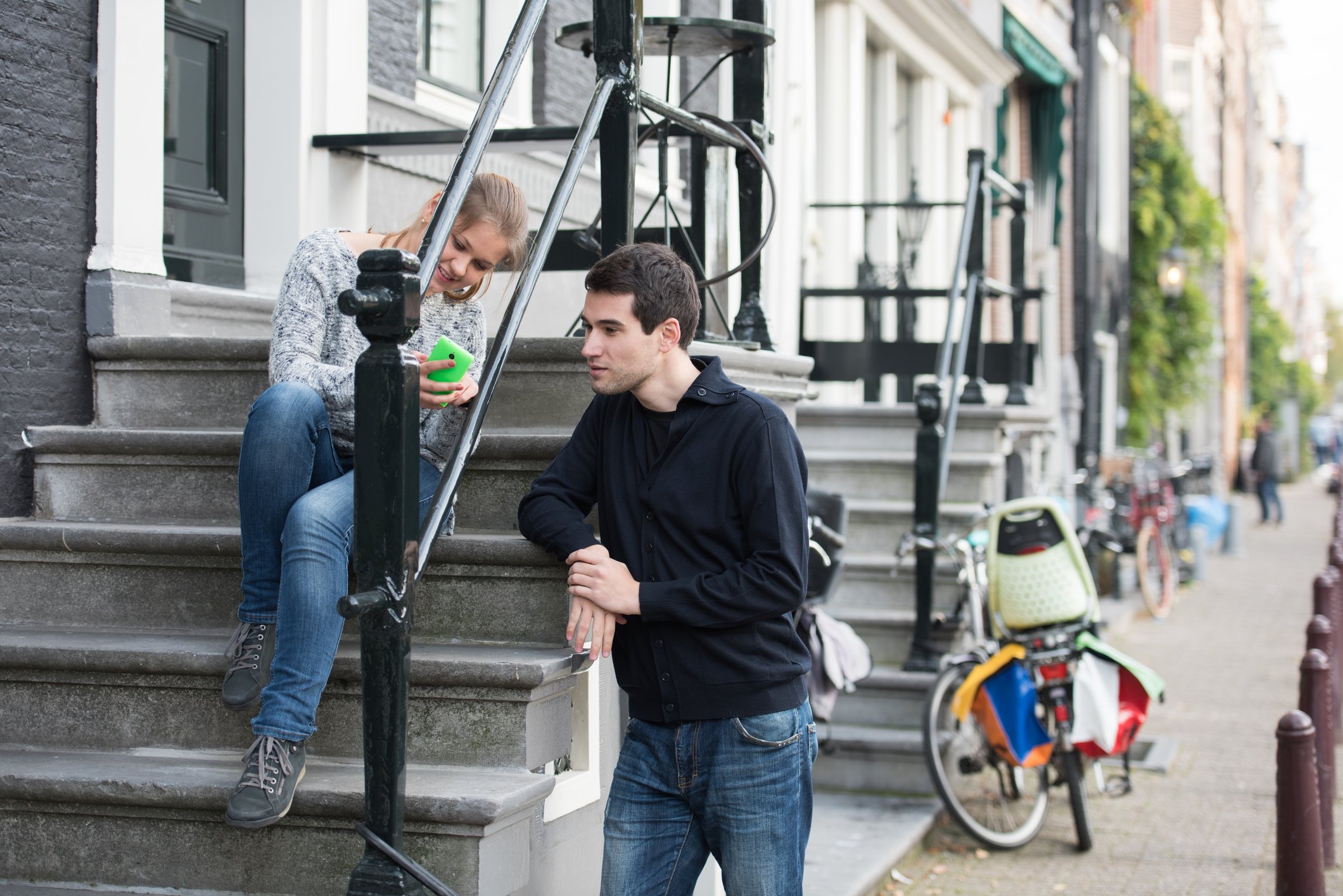Picture this: you’ve been hunting for a home in the Netherlands for months, and your dream house has just popped up. You manage to get a viewing, and you’re in love — but now you need to place a bid.
And you’re completely lost. Should you underbid? Should you offer the asking price? Should you overbid? And if so, by how much?
Here’s all you need to know about placing a winning bid in the Netherlands. 👇
Good to know: This information is based on the experience and expertise of DutchReview. Please note that there are also other pieces of advice conceivable.
What to consider when calculating your bid
The above are all excellent questions, but the best thing to do is set your sentiments aside and channel your inner maths nerd.
Yep, it’s time to gather data. But where do you even begin?
Your maximum mortgage
Before you do anything, you need to know your borrowing power by calculating your maximum mortgage.
The last thing you want is to place a bid only to realise the bank isn’t willing to lend you that amount.
In principle, in the Netherlands, you can finance up to 100% of the home’s value.

You should calculate your potential mortgage, making sure to take any current debts into account.
READ MORE | Types of mortgages in the Netherlands: Dutch ‘hypotheken’ explained
Once you know your borrowing power, you can consider just how much you are willing to overbid on any potential dream homes.
Mortgage providers such as ING offer mortgage advice to expats in the Netherlands. The best way to calculate your mortgage and consider your options is to meet with an expert. Book a completely free consultation with ING.
The value of the home
Another thing to consider is the home’s value versus the asking price.
By value, we mean the result of an actual professional evaluation. You can have this carried out either by companies or housing experts such as a realtor.
Alternatively, you can use an online valuation tool, where you fill in the details of the house in an online form yourself. While this is fast and easy, it’s not as accurate.
However, you’re not completely done once you have a valuation report.

Next, you’re going to want to look into the WOZ value of the home.
This is the house’s value as measured by the Dutch government to determine how much you should pay in taxes and levies.
You can apply to know the WOZ value of a house on the Dutch government’s website.
The condition of the building
Ok, now you have a good idea of the house’s value. So, is it worth bidding above this amount?
That depends on the condition of the house! Ask yourself:
- 🛠️ Is it a fixer-upper?
- ✨ Is it brand new?
- ⚡ How is the energy rating?
- 📆 Is it due for any major works, like a new roof?
These factors play an essential role in determining how much you should bid during the sale.
You may need to invest in the house heavily in the future, which could affect how much you want to offer now.
Sometimes, you may find that the house is being drastically overvalued — even with prices as high as they currently are.
While we all dream of living in a quintessentially Dutch canal house, you need to be practical about its condition — are you willing to cough up the cash to make up for the extra energy costs? Or is the seller simply asking too much?
The final sale price of other houses in this condition and neighbourhood
Determining the perfect bid also takes some detective-like sleuthing.
For example, one of the best indicators of how much you should bid for a house is how much other houses in the area are selling for.
Unfortunately, in the Netherlands, this isn’t so easy to do. If you want to know how much a similar home sold for, you’re going to need a Kadaster report.
READ MORE | 21 Dutch terms you need to know before you buy a house in the Netherlands
However, this is only available a few months after a sale is completed (and we all know how much of a difference a few months can make to housing prices at the moment).
Another alternative is to contact the property’s selling agent and ask them straight out — but there’s only a slight chance they’ll tell you.
The current housing market
Walking hand in hand with the current housing market are the current bidding trends.
With limited supply and plenty of demand, overbidding occurs more and more frequently in the Netherlands.

In fact, in the second quarter of 2024, 66% of successful bids were achieved by overbidding.
While it helps to take trends in the current housing market into consideration, this doesn’t mean you have to overbid on a house.
It’s important to note that 44% of house hunters in the Netherlands were still successful in buying a home, even without overbidding.
And if there’s one thing you don’t want to do, it’s bite off more than you can chew.
The time you have to decide on a bid
If there’s one thing you need to know about an overheated housing market, it’s that when it comes to calculating your bid, you don’t have that much time to crunch those numbers.
In the second quarter of 2024, the average length of time between a house going up for sale and new buyers signing the dotted line was just 27 days.
With things moving this quickly, you don’t have much time to place a bid.
The best thing you can do is gather as much data as possible before you view a home, such as the average selling price of similar homes in that area and your maximum mortgage, for example.
Good to know: In the Netherlands, once you place an offer on a home and it’s accepted, you have three working days to retract your offer with no legal or financial consequences. This is called a “cooling-off period.”
Three ways to calculate your bid when buying a house in the Netherlands
Ok, you have considered all of the above information — but how does one calculate their exact bid?

There are three ways you can do this:
You can do it yourself
The first option is to consider all of the above factors and come up with a bid yourself.
Perhaps the house’s condition is excellent, and similar homes in the area were snapped up quickly.
Then, you might make the decision to overbid when placing your offer.
Or perhaps you see that the roof needs work, in which case you need any extra funds to go towards fixing this and not towards overbidding.
You know your limitations, and if you’re unsure of them, our only advice for you is simple: summon the experts. 👇
You can get an expert involved
If the task feels like something you would rather have an expert handle — fair enough!
Housing experts such as mortgage advisors and real estate agents are often also trained appraisers.
Using these skills, combined with their knowledge of the current housing market, you’ll be given an expert estimation of how much you should bid on your dream home.
Want to learn more about your maximum mortgage and how much you can afford to bid? Book a free consultation with ING’s mortgage experts.
With or without a financing condition?
In the Netherlands you can choose to make an offer with or without a financial clause (met of zonder voorbehoud van financiering).
Making an offer without financing conditions can increase the chance of winning the bid, but it is not without risks. You should talk to your mortgage advisor about whether it is advised to do this in your specific financial situation.
You can make use of an algorithm
The next step is to leave the maths to a calculator.
However, to do this, you’re going to need to gather a lot of data: the selling prices vs. the purchase prices for similar houses, the average house price in your area — and more.

By analysing the data, you can give yourself a relatively accurate estimate of just how much you should be bidding to win your dream house.
Thankfully, there are several businesses that offer these types of tools and will help you determine the correct bid for you.
Our bid was accepted! What’s next?
Sent in the winning bid? First things first, congrats! Now, there are a few more steps you need to take.
Once your bid is accepted, you must sign the purchase contract.
This will initiate the three-day “cooling-off period” in which you can still change your mind.
This period starts on the day after you and the seller have signed the purchase contract. During these three days you can still cancel the purchase.
Haven’t changed your mind? Then contact your mortgage advisor as soon as possible so they can start up the mortgage process!
How have you found the bidding process in the Netherlands? Tell us about your experience in the comments below.
